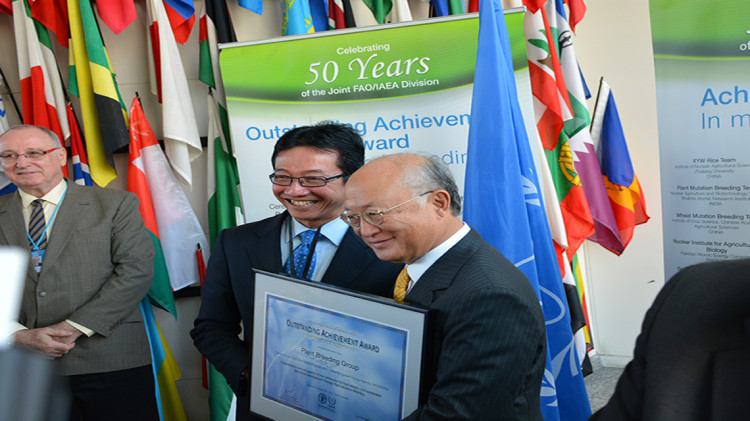Awards honouring teams of scientists who have helped increase food security by using radiation to breed better crop varieties were presented today by IAEA Director General Yukiya Amano.
Mutation breeding, which uses radiation to mimic natural plant mutation events, is a well-established method that enables plant breeders to work with farmers to develop variations of rice, barley, sesame and other crops that are higher-yielding and more resistant to disease.
The awards were initiated by the Joint FAO/IAEA Division of Nuclear Techniques in Food and Agriculture to celebrate successes achieved so far and promote the development of further sustainable crop varieties. The Joint Division - a strategic partnership between the IAEA and the UN's Food and Agriculture Organization that is celebrating its 50th anniversary this year - supports countries in their use of the method.
"Through the use of plant mutation breeding, nuclear techniques help to create new strains of plants with characteristics that allow them to resist disease and thrive under harsh conditions, such as high altitudes and saline soils," Director General Amano said at an award ceremony at the IAEA headquarters, where he handed certificates to representatives of the countries of award recipients.
"The development of new varieties of food crops will be increasingly important in the future as the world tries to adapt to the potential impacts of climate change."
The following scientists and teams were selected for Outstanding Achievement Awards:
- Peru: Cereal and Native Grains Research Program (Universidad Nacional Agraria La Molina)
Mutant breeding helped Peru tackle the harsh conditions its farmers face at high altitudes. The improved mutant barley and amaranth varieties produced, thriving at altitudes of up to 5 000 metres, provide seven million farmers in the Andean region with more food and income. - China: Team of Radiation Mutant Breeding (Jiangsu Academy of Agricultural Sciences)
The team has released 17 mutant varieties, including eight rice, five wheat and four barely cultivars. Three of the mutant wheat varieties have been planted on more than 30 million hectares and generated more than 30 billion Yuan RMB (about US$ 4.9 billion) of socio-economic benefit. - Bangladesh: Dr. Mirza Mofazzal Islam (Bangladesh Institute of Nuclear Agriculture)
Nine mutant varieties of fibre jute, vegetable jute, mungbean and chickpea with improved yield and quality traits were released and widely accepted by farmers for cultivation. The mutant varieties have increased yield from 20 to 45 per cent compared to other existing crop varieties. The area where these mutant varieties are cultivated is increasing. - Indonesia: Plant Breeding Group (National Nuclear Energy Agency)
Mutant breeding has benefited hundreds of thousands of farmers and millions of consumers in Indonesia. The Group's research led to the release 20 mutant rice varieties, one of which has produced an estimated total income of USD 2 billion. The mutant rice varieties make up 10 per cent of the total rice varieties registered. - Viet Nam: Agricultural Genetics Institute (Viet Nam Academy of Agricultural Sciences)
Rice and soybean mutant varieties have vastly improved farmers' livelihoods: One top mutant rice variety created almost US $540 million in additional value compared to older varieties. Soybean mutant varieties increased income by a third for almost 3.5 million farmers.
The following were selected for Achievement Awards:
- China: XYW Rice Team (Institute of Nuclear Agricultural Sciences, Zhejiang University)
- India: Plant Mutation Breeding Team (Bhabha Atomic Research Institute)
- China: Wheat Mutation Breeding Team (Chinese Academy of Agricultural Sciences)
- Pakistan: Nuclear Institute for Agriculture and Biology (Pakistan Atomic Energy Commission)
- China: Genetics Breeding Team of SIAE (Sichuan Institute of Atomic Energy)
- Viet Nam: Institute of Agricultural Sciences for Southern Viet Nam (Viet Nam Academy of Agricultural Sciences) and Centre for Nuclear Techniques (Viet Nam Atomic Energy Institute)
- Afghanistan: Mr. Sekander Hussaini (Academy of Sciences of Afghanistan)
- Thailand: Rice Department, Bureau of Rice Research Development (Department of Agriculture)
- Brazil: Research Group: Use of in vivo and in vitro induced mutation in plant breeding (CENA, IAC, IAPAR, EPAGRI, ESALQ, UNESP, Centro de Melhoramento Genético do Fumo)
- Republic of Korea: Radiation Breeding Team, (Korea Atomic Energy Research Institute)
- Egypt: Mr. Abdel Shafy Ibrahim Ragab (Nuclear Research Centre, Atomic Energy Authority)
- Sweden: Ms. Udda Lundqvist (Nordic Genetic Resource Centre)
- Viet Nam: Phuong Tan Tran and Cua Quang Ho (Department of Agricultural and Rural Development)
- Cuba: Ms. Maria Caridad González Cepero (National Institute of Agricultural Science)
- Yemen: Mr. Abdulwahid A Saif (Agricultural Research and Extension Authority)
- Malaysia: Malaysian Nuclear Agency
- Republic of Korea: Rice Research Division (National Institute of Crop Science, Rural Development Administration)
- Sri Lanka: Department of Agriculture
The Joint FAO/IAEA Division of Nuclear Techniques in Food and Agriculture has successfully tackled a range of agricultural problems since its establishment in 1964, including global freedom from rinderpest, the eradication of the tsetse fly on Zanzibar Island, Tanzania, and water-saving agriculture in seven African countries.


